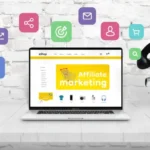In today’s technology-driven world, businesses are shifting their focus online, creating an explosive demand for digital marketers. From startups to multinational corporations, companies need experts who can drive traffic, increase brand visibility, and boost sales.
But what if you’re brand new to this space?
Here’s the good news: you can start digital marketing with no experience. Whether you’re a student, stay-at-home parent, or simply seeking a career switch, this guide will show you exactly how to enter the digital marketing world, even if you’re starting from scratch.
Digital marketing refers to the use of digital channels, platforms, and technologies to promote and sell products or services to consumers and businesses. It involves a range of online marketing activities designed to reach audiences through the internet and electronic devices.
Digital marketing is the practice of promoting products or services through digital channels like:
-
Search engines (Google, Bing)
-
Social media (Facebook, Instagram, TikTok)
-
Email marketing
-
Affiliate marketing
-
Content marketing
-
YouTube/video marketing
Step-by-Step Guide to Start Digital Marketing With No Experience
1. Understand the Basics of Digital Marketing
Digital marketing is the promotion of products or services using digital channels to reach consumers. It encompasses a broad range of strategies, tools, and platforms. Understanding its basics is critical for building effective marketing campaigns and adapting to rapidly changing digital trends.
Before diving in, learn the core concepts. The key branches include:
-
Search Engine Optimization (SEO)
-
Pay-Per-Click (PPC) Advertising
-
Social Media Marketing (SMM)
-
Email Marketing
-
Affiliate Marketing
-
Content Marketing
-
Analytics & Data Tracking
Start with free resources:
-
Google Digital Garage
-
HubSpot Academy
-
Coursera Free Digital Marketing Courses
-
Meta Blueprint (Facebook ads)
2. Choose a Digital Marketing Path
Once you understand the basics of digital marketing, the next step is deciding which specialization or path suits your interests, skills, and career goals. Digital marketing is a broad field, and choosing the right path helps you build focused expertise and become more valuable in the job market or as a business owner.
Ask Yourself These Questions First:
-
Do I prefer creative or analytical work?
-
Do I enjoy writing, visuals, data, or tech?
-
Am I looking for a freelance, agency, in-house, or entrepreneurial role?
-
Do I want to focus on short-term results (like ads) or long-term growth (like SEO/content)?
How to Choose the Right Path:
| Preference | Suggested Path |
|---|---|
| You love writing and storytelling | Content Marketing |
| You’re analytical and data-driven | SEO, PPC, Analytics |
| You’re creative and trend-aware | Social Media Marketing |
| You enjoy persuasion and communication | Email or Affiliate Marketing |
| You want fast, measurable results | PPC, Social Ads |
| You prefer long-term growth strategies | SEO, Content |
Choosing a digital marketing path is like picking a lane on a multi-lane highway they all go forward, but your lane determines how fast you grow and what kind of work you do. There’s no wrong choice, just the one that aligns with your passion, strengths, and career goals.
3. Create Your Own Digital Presence
If you’re learning digital marketing whether to land a job, build a business, or freelance your own digital presence is your resume, portfolio, and proof of skill all in one. Before you market anything for others, you should be able to market yourself online.
Key Elements of a Strong Digital Presence:
1. Personal Website or Blog
-
Acts as your home base online.
-
Use it to showcase:
-
Your bio/about page
-
Portfolio of work or case studies
-
Blog posts on industry topics (great for SEO + showing knowledge)
-
Contact info
-
Tools: WordPress, Webflow, Wix, Carrd
2. Professional Social Media Profiles
-
LinkedIn: Essential for professional networking and thought leadership.
-
Twitter/X or Threads: Share insights, engage with the marketing community.
-
Instagram/TikTok: Great for building a creative brand if you focus on visual or social content.
3. Content Creation
-
Start creating content in your chosen area (SEO, social, content, etc.).
-
Post regularly to build authority and attract opportunities.
-
Blog posts
-
YouTube tutorials
-
Short-form videos
-
Case studies of test campaigns
-
4. Personal Branding
-
Choose a consistent:
-
Tone of voice (funny, serious, professional, casual)
-
Color palette and visual style (especially on social media)
-
Username/handle across platforms
-
Tip: Think of yourself as a mini brand people should instantly recognize your style or message.
5. Online Portfolio
-
If you’re applying for jobs or clients, an online portfolio is a must.
-
Include client work (if any), personal projects, mock campaigns, SEO/blog experiments, or social media strategies.
-
Even if you haven’t worked for others, show what you can do with personal or simulated projects.
-
4. Learn SEO and Content Writing
If you’re serious about digital marketing, learning SEO (Search Engine Optimization) and content writing is essential. These two skills form the backbone of organic (non-paid) marketing and are crucial for driving long-term, sustainable traffic to websites.
You Can Also Read: Affiliate Marketing 101: What It Is and How to Get Started
What Is SEO?
Search Engine Optimization (SEO) is the process of improving your website and content so that it ranks higher in search engine results (like Google).
Core Components of SEO:
-
Keyword Research
-
Find out what people are searching for.
-
Tools: Google Keyword Planner, Ubersuggest, Ahrefs, SEMrush.
-
Goal: Target high-volume, low-competition keywords that match your audience’s intent.
-
-
On-Page SEO
-
Optimize each page’s content and structure.
-
Key practices:
-
Use keywords in titles, headings (H1, H2), meta descriptions, and URLs.
-
Include internal links to other pages on your site.
-
Add images with alt text.
-
Write for readability (short paragraphs, bullet points, etc.).
-
-
-
Off-Page SEO
-
Build backlinks (other sites linking to your content), which boost your site’s authority.
-
Tactics: Guest posting, outreach, social sharing.
-
-
Technical SEO
-
Focuses on how well search engines can crawl and index your site.
-
Key elements:
-
Fast load speed
-
Mobile-friendly design
-
Clean site architecture
-
Secure HTTPS
-
-
What Is Content Writing?
Content writing is creating written material that informs, entertains, or persuades all while meeting business or marketing goals.
Key Principles of Effective Content Writing:
-
Write for the User First, Search Engines Second
-
Always provide value to readers.
-
Use keywords naturally don’t “stuff” them.
-
-
Use the AIDA Framework
-
Attention: Grab it with a strong headline.
-
Interest: Keep them reading with engaging intro/content.
-
Desire: Build interest in your offer, product, or solution.
-
Action: End with a clear CTA (Call to Action).
-
-
Match Content to Search Intent
-
Informational: “How to change a tire”
-
Navigational: “Nike official site”
-
Transactional: “Buy running shoes online”
-
-
Edit Ruthlessly
-
Cut fluff, fix grammar, and clarify.
-
Tools: Grammarly, Hemingway Editor.
-
5. Practice With Free Tools
One of the best ways to learn digital marketing is by getting hands-on experience and thankfully, there are many free tools that let you practice real skills without spending money.
Top Free Tools by Category
SEO & Website Analysis
-
Google Search Console
-
See how your site performs in Google Search.
-
Analyze impressions, clicks, and keyword rankings.
-
-
Ubersuggest
-
Conduct keyword research, site audits, and content ideas.
-
-
MozBar
-
Chrome extension for quick SEO analysis of any website.
-
Content Writing & Optimization
-
Grammarly
-
Helps improve spelling, grammar, and clarity.
-
-
Hemingway Editor
-
Highlights complex sentences and readability issues.
-
-
Answer the Public
-
Visual keyword research tool that shows what people are asking online.
-
Analytics
-
Google Analytics 4 (GA4)
-
Track website visitor behavior, traffic sources, and conversion rates.
-
-
Google Looker Studio (formerly Data Studio)
-
Create visual marketing dashboards and reports for free.
-
Social Media Management
-
Canva (Free Plan)
-
Design social media graphics, ads, and content templates.
-
-
Buffer (Free Plan)
-
Schedule posts across multiple social platforms.
-
-
Meta Business Suite
-
Manage Facebook and Instagram pages, schedule content, and view analytics.
-
Email Marketing
-
Mailchimp (Free Tier)
-
Build email lists and send up to 500 emails per month for free.
-
-
Sender.net
-
Another beginner-friendly free email marketing platform.
-
Website Building
-
WordPress.com or Wix (Free Plans)
-
Set up a basic website or blog to test SEO and content skills.
-
-
Google Sites
-
Very simple option to build quick, no-code landing pages.
-
6. Learn Affiliate Marketing (Great for Beginners)
Affiliate marketing is one of the most beginner-friendly ways to start earning money online while learning digital marketing skills. It’s low-risk, low-cost, and teaches you real-world marketing techniques.
Affiliate marketing is a performance-based strategy where you promote other companies’ products or services and earn a commission for every sale, lead, or action generated through your unique referral link.
How It Works:
-
Join an Affiliate Program
-
Example: Amazon Associates, ClickBank, ShareASale, PartnerStack.
-
-
Get a Unique Affiliate Link
-
This link tracks your referrals.
-
-
Promote the Product
-
Use your blog, YouTube, social media, or email to share the link.
-
-
Earn Money
-
When someone clicks your link and buys (or signs up), you earn a percentage.
-
7. Stay Updated with Industry Trends
Digital marketing evolves quickly. Keep learning through:
-
Blogs: Neil Patel, Moz, HubSpot, Backlinko
-
YouTube Channels: Matt Diggity, Income School, Miles Beckler
-
Podcasts: Marketing School, Smart Passive Income
-
Newsletters: The Hustle, Marketing Brew
Join communities like Reddit’s r/digital_marketing, GrowthHackers, or Facebook groups to connect with others.
Frequently Asked Questions
-
Do I need a degree to start a career in digital marketing?
No! A degree can help, but it’s not required. Most employers and clients care more about your skills, portfolio, and practical experience than your education background.
-
How long does it take to learn digital marketing?
You can learn the basics in a few weeks, but mastering the field can take several months to a year, depending on how much time you dedicate and how deep you go.
-
Can I make money as a beginner in digital marketing?
Yes. Many beginners start freelancing, working part-time, or earning from affiliate marketing, content creation, or managing social media for small businesses.
-
Should I start with SEO or social media marketing?
Start with the one that matches your strengths:
-
If you enjoy writing, long-term results, and strategy → SEO
-
If you’re creative, love trends, and enjoy quick engagement → Social Media
-
Conclusion
Getting started in digital marketing with no experience may seem intimidating, but it’s entirely possible—and incredibly rewarding. The digital world is filled with free tools, training resources, and platforms ready to help you learn, grow, and even earn from the very beginning.
Whether you’re launching a blog, running social media campaigns, or promoting affiliate products, the most important step is to start. Don’t wait until everything is perfect. Begin learning, experimenting, and building your online presence today.
Remember, every expert was once a beginner.
With consistency, curiosity, and a willingness to adapt, you can go from a complete newbie to a confident digital marketer earning income online. The demand is real. The tools are free. The opportunity is now.
So take that first step your digital marketing journey starts today.
Reference
You Can Also Read
Affiliate Marketing 101: What It Is and How to Get Started
10 Essential Skills Every Digital Marketer Needs in 2025
The Difference Between Social Media Management and Community Management



